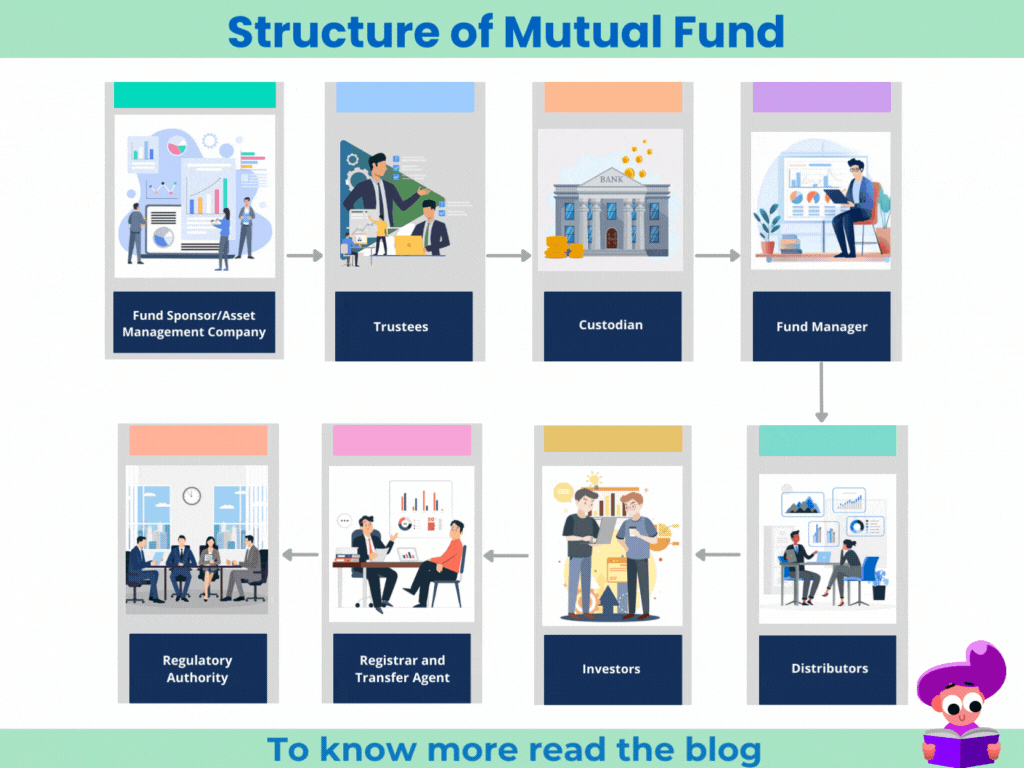What is the Structure of Mutual Fund?
The structure of a mutual fund involves various components and entities working together to facilitate the investment process. Here are the key elements of a mutual fund structure:
Fund Sponsor/Asset Management Company (AMC): The fund sponsor or AMC is the entity that establishes and manages the mutual fund. The AMC hires the fund manager and is responsible for overseeing the fund's operations, investment strategies, compliance with regulations, and investor services. Examples of AMCs include HDFC Mutual Fund, ICICI Prudential Mutual Fund, and SBI Mutual Fund.
Trustees: The mutual fund operates under the oversight of a board of trustees. The trustees, appointed by the fund sponsor, have a fiduciary responsibility to protect the interests of the mutual fund unitholders. They monitor the activities of the AMC, ensure compliance with regulations, and safeguard the assets of the fund.
Custodian: The custodian is a bank or financial institution responsible for holding and safeguarding the mutual fund's assets. They maintain the custody of securities, settle trades, and perform other administrative functions related to the safekeeping of the fund's holdings.
Fund Manager: The fund manager is responsible for making investment decisions on behalf of the mutual fund. They analyze market trends, select securities, allocate assets, and manage the fund's portfolio in accordance with the fund's investment objectives and strategy. The fund manager's expertise and track record play a crucial role in the fund's performance.
Investors/Unitholders: Investors, also known as unitholders, are individuals or entities that invest in the mutual fund by purchasing units. They contribute funds to the mutual fund and participate in the gains or losses generated by the fund's investments. The number of units held by an investor represents their proportional ownership in the mutual fund's assets.
Distributors/Intermediaries: Distributors or intermediaries play a vital role in facilitating the sale of mutual fund units to investors. They can be independent financial advisors, banks, or brokerage firms. Distributors provide information, advice, and assistance in selecting suitable mutual funds based on investors' needs and preferences. They earn commissions or fees for their services.
Registrar and Transfer Agent (RTA): The RTA is responsible for maintaining investor records, processing transactions, and providing investor services for the mutual fund. They handle activities such as new account setup, unit allotment, redemptions, and investor communications. Examples of RTAs in India include Computer Age Management Services (CAMS) and Karvy.
Regulatory Authority: In each country, there is a regulatory authority that governs and regulates mutual funds. In India, it is the Securities and Exchange Board of India (SEBI). The regulatory authority sets guidelines, rules, and regulations to ensure investor protection, transparency, and fair practices in the mutual fund industry.
These components work together to create a well-defined structure for mutual funds, enabling investors to pool their funds and gain exposure to a diversified portfolio of securities. The structure ensures transparency, accountability, and efficient management of the mutual fund's assets.


